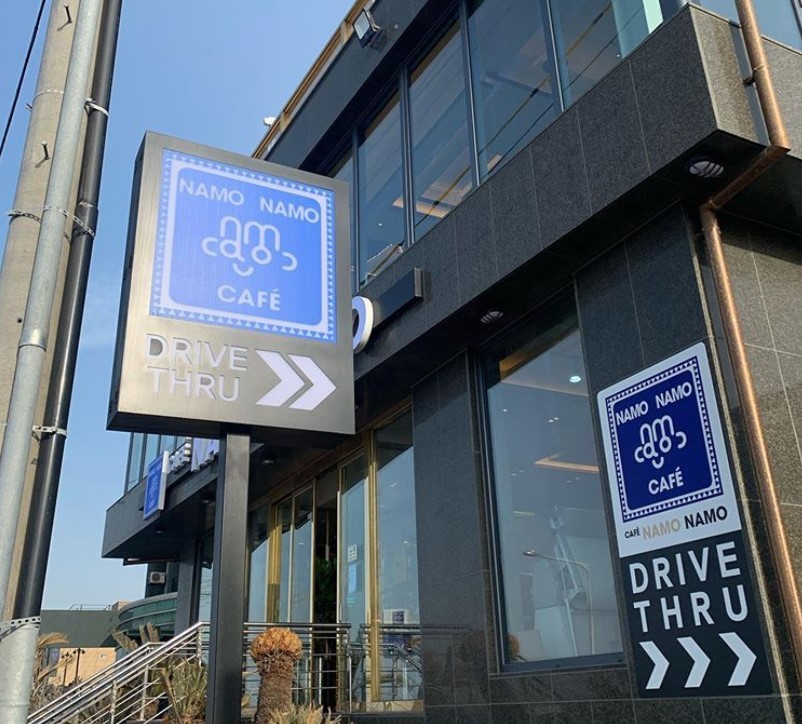While Korea’s drive-thru testing for the novel coronavirus grabbed the attention of countries across the world, the drive-thru model is recently being applied to other sectors of life here. Customers can now pick up diverse culinary dishes through drive-thru services, minimizing the chances of virus infection while still enjoying the delicacies.
Drive for galbi and samgyetangRecently, a variety of Korean dishes, from galbi -- the short ribs widely enjoyed as Korean barbecue -- to samgyetang, or ginseng chicken soup, have become available via drive-thru services.
Balsan Samgyetang in Gangseo, western Seoul, has offered drive-thru services over the past years, but the number of customers has soared twofold since the viral outbreak.
“Not many people knew of the service before the coronavirus outbreak, but now it seems they are enjoying the convenience of the drive-thru service,” Sim Mi-jung, the owner of the restaurant, told The Korea Herald.
Galbi Garden, which sells a variety of galbi dishes in Seongnam, Gyeonggi Province, kicked off the service in late March, as customers halted their visits to the restaurant wary of possible coronavirus infection.
“The sales sharply decreased after the viral outbreak, but the drive-thru service redeemed the damage,” said restaurant owner Kim Hyun-ho.
Samwon Garden, the storied 44-year-old Michelin-starred galbi restaurant in Gangnam, Seoul, began its drive-thru service for the first time after the COVID-19 outbreak. The landmark restaurant offers takeout marinated beef short ribs and bulgogi to be enjoyed at home.
Drive-thru comes to local cafes
When it comes to cafes, drive-thru service had only been popular for major franchise cafes in Korea, like Starbucks. However, now even local mom-and-pop shops have begun adapting to the drive-thru system.
“It seems the drive-thru service sparked more interest in Korea after drive-thru COVID-19 testing stations popped up here,” Kim Seon-ju, manager of Namo Namo Cafe on Jeju Island, which began drive-thru service in February, told The Korea Herald.
“Our drive-thru service is not yet as popular as those of franchise cafes such as Starbucks because we have just started, but we certainly see more customers using the service after we began the promotion on Instagram.”
Cafe Blest in Seongdong-gu, Seoul, only takes orders via phone or drive-thru to comply with the government’s social distancing measures.
“We are located in a quiet neighborhood, so not many knew of the drive-thru service, but now more are using it,” cafe owner Chang Ha-hyun said. “We are trying to come up with more innovative ways to provide better drive-thru service.”
Fresh seafood to your carNoryangjin Fisheries Wholesale Market in Seoul also launched a drive-thru service on March 26, proving popular with seafood lovers.
People can take out seafood dishes such as assorted sashimi platters, seasoned skate, fried shrimp and raw abalone from the drive-thru in minutes.
According to the National Federation of Fisheries Cooperatives, the Noryangjin Fisheries Wholesale Market recorded 700 million won ($578,000) in sales from March 26 to Wednesday. Twelve percent of that was generated via drive-thru. The federation said that the numbers have almost returned to their rate before the virus outbreak.
The market is to operate its drive-thru service until Sunday, on worries of rising seasonal temperatures. However, it will continue to offer “contactless service” through a mobile app managed by the National Federation of Fisheries Cooperatives, where customers can pick up reserved seafood at a designated spot outside of the market.
By Park Yuna (
yunapark@heraldcorp.com)






![[Herald Interview] 'Trump will use tariffs as first line of defense for American manufacturing'](http://res.heraldm.com/phpwas/restmb_idxmake.php?idx=644&simg=/content/image/2024/11/26/20241126050017_0.jpg)
![[Health and care] Getting cancer young: Why cancer isn’t just an older person’s battle](http://res.heraldm.com/phpwas/restmb_idxmake.php?idx=644&simg=/content/image/2024/11/26/20241126050043_0.jpg)
